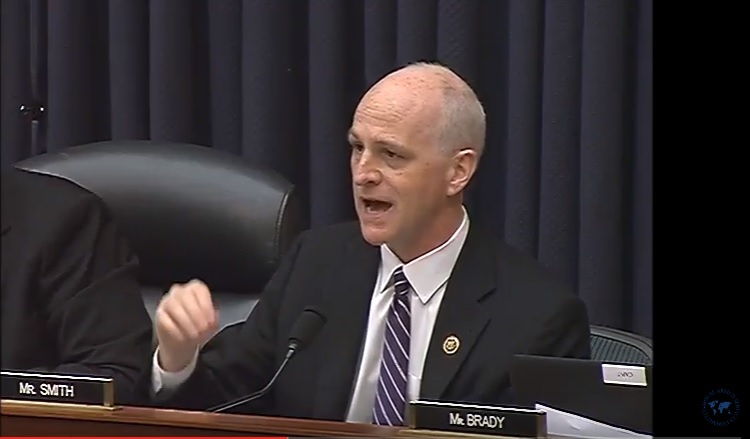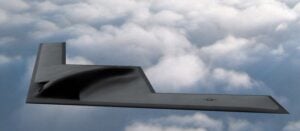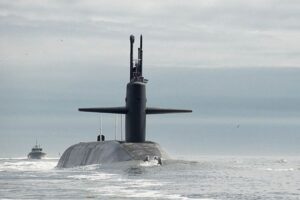WASHINGTON: The Democratic lawmaker slated to lead the House Armed Services Committee next year rejected the Pentagon’s recent Nuclear Posture Review and called into question the decades-old nuclear triad on Wednesday, previewing some of the upcoming battles between the new Democratic House and the Trump administration.
Rep. Adam Smith, long a critic of the planned $1.2 trillion effort to upgrade the nation’s air, land and sea-based nuclear forces and build new low-yield nukes, slammed the assumptions behind the Pentagon’s nuclear review, saying the Pentagon needs to “totally redo” the plan it released earlier this year, because “we cannot afford what they’re talking about.”
The goal to reset the entire nuclear enterprise in the face of rising competition with nuclear-armed states Russia and China has its genesis under the Obama administration, but the price tag was reached late last year.
Smith told a meeting of the Ploughshares Fund, a group that opposes nuclear weapons, that the growing national debt and the need to modernize and upgrade conventional ships and aircraft make the plan unworkable: “Let’s put aside for the moment whether or not it’s wise, when you look at the needs we have in national security, the needs we have in the country and the $22 trillion debt, what they’re talking about in terms of totally rebuilding our nuclear weapons capacity in all pieces of the triad is way beyond what we can afford.”
Late last year, the Congressional Budget Office estimated that building the three new platforms to deliver nuclear weapons would cost $772 billion though 2046. The armed services are working to field the Columbia-class nuclear missile submarine to replace the aging Ohio-class; the Air Force’s B-21 stealth bomber; the Ground Based Strategic Deterrent, a replacement for the Minuteman III intercontinental ballistic missile; and a new nuclear cruise missile in the coming decades.
Smith said that he thinks skeptical senators and the White House might be swayed to roll back some of this spending if presented with this choice: fund the nukes or buy a range of conventional capabilities high on the Pentagon and Congress’s wish list.
“You can have all of these nuclear weapons,” he said, “which we don’t need, which are simply creating a greater risk, or you can have some of the stuff you want on the conventional side. From a dollar standpoint you cannot have both. That’s how ultimately we convince the Senate and the White House to reduce. It’s a choice. You can’t have it all.”
The backbone of the United States’ nuclear planning and deterrent since the start of the Cold War has been what’s called the Triad — land, air and sea-based nuclear weapons. Smith says, “the rationale for the triad, I don’t think, exists anymore. The rationale for the numbers of nuclear weapons doesn’t exist anymore.”
Smith also rejected another program that found favor in the 2019 defense funding bill: a low-yield submarine-launched nuclear missile. The weapon would be an upgraded warhead for the Navy’s Trident II D5 ballistic missile, and critics have argued that it could lower the threshold for the use of nuclear weapons. Smith introduced a bill banning the missile in September.
“It makes no sense for us to build low-yield nuclear weapons,” Smith said Wednesday. “There is no advantage to that and it is dangerously escalating. It just starts a new nuclear arms race.”
One way to reduce the size of the nuclear arsenal is to double down on the number, and depth, of multilateral engagements with allies and potential foes Smith said, in order to work through the thorny issues of nuclear proliferation. But that is something the Trump White House is unlikely to do.
Despite rounds of talks with North Korea, engagement with nuclear powers “is where the White House is so dangerous right now. They are opposed to multilateralism almost on principle,” Smith said.
National Security Advisor John Bolton has long been a fierce critic of international treaties and agreements, arguing that nations should be free to do as they please without interference. In Bolton, President Trump has found an ideological fellow traveller.
While Smith is relying on the new Democratic majority in the House and fiscal hawks in the Senate to back him up on reducing the nuclear modernization bill, a study group he helped establish — the Congressionally-mandated National Defense Strategy Commission — actually takes the opposite view.
Released Wednesday morning, the study, whose authors were appointed by Republican and Democratic members of Congress — including Smith — concluded that spending on nuclear modernization was critically important.
The Pentagon “must remain committed to the bipartisan nuclear modernization program outlined in the 2018 Nuclear Posture Review,” the report said. “This pertains especially to modernizing the triad of bombers, intercontinental ballistic missiles, and ballistic missile submarines.”
The 12-member commission of former general officers and Pentagon officials concluded, “given that investments made today will pay strategic dividends well into the 2070s and 2080s, America can surely afford to pay this price to preserve such a critical element of its national defense.”
That proposition will be tested in the next Congress, when a Democratic House and a Republican Senate begin hammering out versions of President Trump’s 2020 defense spending request. If past actions are a guide, Democrats will end up quietly supporting the vast majority of the nuclear modernization bill.
Navy jet trainer fleet operations remain paused after engine mishap
One week after the incident, a Navy spokesperson says the service is continuing to assess the fleet’s ability to safely resume flight.





























